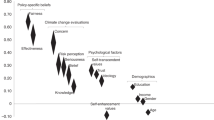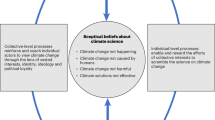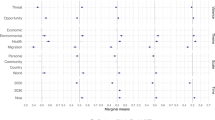Abstract
It is intuitive to assume that concern about climate change should be preceded by knowledge about its effects1,2. However, recent research suggests that knowledge about climate change has only a limited effect on shaping concern about climate change3,4,5,6. Our view is that this counterintuitive finding is a function of how knowledge is typically measured in studies about climate change. We find that if it is measured in a domain-specific and multidimensional way, knowledge is indeed an important driver of concern about climate change—even when we control for human values. Likewise, different dimensions of knowledge play different roles in shaping concern about climate change. To illustrate these findings, we present the results from a survey deployed across six culturally and politically diverse countries. Higher levels of knowledge about the causes of climate change were related to a heightened concern. However, higher levels of knowledge about the physical characteristics of climate change had either a negative or no significant effect on concern. Efforts aimed at improving public knowledge about climate change are therefore not the lost cause that some researchers claim they may be.
This is a preview of subscription content, access via your institution
Access options
Subscribe to this journal
Receive 12 print issues and online access
$209.00 per year
only $17.42 per issue
Buy this article
- Purchase on Springer Link
- Instant access to full article PDF
Prices may be subject to local taxes which are calculated during checkout

Similar content being viewed by others
References
Walsh, E. M. & Tsurusaki, B. K. Social controversy belongs in the climate science classroom. Nature Clim. Change 4, 259–263 (2014).
Arvai, J., Gregory, R., Bessette, D. & Campbell-Arvai, V. Decision support for developing energy strategies. Issues Sci. Technol. 28, 43–52 (2012).
Malka, A., Krosnick, J. A. & Langer, G. The association of knowledge with concern about global warming: trusted information sources shape public thinking. Risk Anal. 29, 633–647 (2009).
Kahan, D. M. et al. The polarizing impact of science literacy and numeracy on perceived climate change risks. Nature Clim. Change 2, 732–735 (2012).
Kellstedt, P. M., Zahran, S. & Vedlitz, A. Personal efficacy, the information environment, and attitudes toward global warming and climate change in the United States. Risk Anal. 28, 113–126 (2008).
Menny, C., Osberghaus, D., Pohl, M. & Werner, U. General Knowledge About Climate Change, Factors Influencing Risk Perception and Willingness to Insure Discussion Paper No. 11-060 (ZEW-Centre for European Economic Research, 2011).
Sundblad, E-L., Biel, A. & Gärling, T. Knowledge and confidence in knowledge about climate change among experts, journalists, politicians, and laypersons. Environ. Behav. 41, 281–302 (2009).
Bord, R. J., O’Connor, R. E. & Fisher, A. In what sense does the public need to understand global climate change? Public Underst. Sci. 9, 205–218 (2000).
Helgeson, J., van der Linden, S. & Chabay, I. in Learning for Sustainability in Times of Accelerating Change (eds Wals, A. E.J. & Corcoran, P. B.) 329–346 (Wageningen Academic, 2012).
Stevenson, K., Peterson, M. N., Bondell, H., Moore, S. & Carrier, S. Overcoming skepticism with education: interacting influences of worldview and climate change knowledge on perceived climate change risk among adolescents. Climatic Change 126, 293–304 (2014).
Milfont, T. L. The interplay between knowledge, perceived efficacy, and concern about global warming and climate change: a one-year longitudinal study. Risk Anal. 32, 1003–1020 (2012).
Reser, J. P., Bradley, G. L., Glendon, A. I., Ellul, M. & Callaghan, R. Public Risk Perceptions, Understandings and Responses to Climate Change in Australia and Great Britain (Griffith University, National Climate Change Adaptation Research Facility, 2012).
Kaiser, F. G. & Fuhrer, U. Ecological behavior’s dependency on different forms of knowledge. Appl. Psychol. 52, 598–613 (2003).
Tobler, C., Visschers, V. H. & Siegrist, M. Consumers’ knowledge about climate change. Climatic Change 114, 189–209 (2012).
Corner, A. Science literacy and climate views. Nature Clim. Change 2, 710–711 (2012).
Ajzen, I. The theory of planned behavior. Organ. Behav. Hum. Decis. 50, 179–211 (1991).
Ajzen, I., Joyce, N., Sheikh, S. & Cote, N. G. Knowledge and the prediction of behavior: the role of information accuracy in the theory of planned behavior. Basic Appl. Soc. Psychol. 33, 101–117 (2011).
Shi, J., Visschers, V. H. & Siegrist, M. Public perception of climate change: the importance of knowledge and cultural worldviews. Risk Anal. 35, 2183–2201 (2015).
Douglas, M. & Wildavsky, A. How can we know the risks we face? Why risk selection is a social process. Risk Anal. 2, 49–58 (1982).
Kahan, D. M., Braman, D., Monahan, J., Callahan, L. & Peters, E. Cultural cognition and public policy: the case of outpatient commitment laws. Law Hum. Behav. 34, 118–140 (2010).
Schwartz, S. H. Universals in the content and structure of values: theoretical advances and empirical tests in 20 countries. Adv. Exp. Soc. Psychol. 25, 1–65 (1992).
Stern, P. Toward a coherent theory of environmentally significant behavior. J. Soc. Issues 56, 407–424 (2000).
Corner, A., Markowitz, E. & Pidgeon, N. Public engagement with climate change: the role of human values. WIREs Clim. Change 5, 411–422 (2014).
Steg, L., De Groot, J. I. & Clayton, S. The Oxford Handbook of Environmental and Conservation Psychology (Oxford Univ. Press, 2012).
Van der Linden, S. The social-psychological determinants of climate change risk perceptions: towards a comprehensive model. J. Environ. Psychol. 41, 112–124 (2015).
Guy, S., Kashima, Y., Walker, I. & O’Neill, S. Investigating the effects of knowledge and ideology on climate change beliefs. Eur. J. Soc. Psychol. 44, 421–429 (2014).
Van der Linden, S. A conceptual critique of the cultural cognition thesis. Sci. Commun. 38, 128–138 (2016).
Oreg, S. & Katz-Gerro, T. Predicting proenvironmental behavior cross-nationally: values, the theory of planned behavior, and value-belief-norm theory. Environ. Behav. 38, 462–483 (2006).
De Groot, J. & Steg, L. General beliefs and the theory of planned behavior: The role of environmental concerns in the TPB. J. Appl. Soc. Psychol. 37, 1817–1836 (2007).
Molenaar, I. W., Sijtsma, K. & Boer, P. MSP5 for Windows: A Program for Mokken Scale Analysis for Polytomous Items: Version 5.0: User’s Manual (Iec ProGAMMA, 2000).
Van Schuur, W. H. Mokken scale analysis: between the Guttman scale and parametric item response theory. Polit. Anal. 11, 139–163 (2003).
STAT_TAB (Swiss Federal Statistical Office, accessed 20 September 2015); http://go.nature.com/35VvZg
Acknowledgements
Financial support for J. Shi, which was provided by the China Scholarship Council (CSC), is gratefully acknowledged. The authors also would like to thank Respondi AG, InterfaceASIA Holden and Insightrix Research Inc. for assistance with the survey.
Author information
Authors and Affiliations
Contributions
All authors contributed to the design, data collection and written presentation for the research reported here. In addition, J.S., V.H.M.V. and M.S. organized and managed the data collection in China, Germany, Switzerland and the UK and J.A. coordinated data collection in Canada and the US. J.S. was primarily responsible for data analysis and for the first complete draft of this manuscript.
Corresponding author
Ethics declarations
Competing interests
The authors declare no competing financial interests.
Supplementary information
Supplementary Information
Supplementary Information (PDF 854 kb)
Rights and permissions
About this article
Cite this article
Shi, J., Visschers, V., Siegrist, M. et al. Knowledge as a driver of public perceptions about climate change reassessed. Nature Clim Change 6, 759–762 (2016). https://doi.org/10.1038/nclimate2997
Received:
Accepted:
Published:
Issue Date:
DOI: https://doi.org/10.1038/nclimate2997
This article is cited by
-
Knowledge as a key determinant of public support for autonomous vehicles
Scientific Reports (2024)
-
How climate policy commitments influence energy systems and the economies of US states
Nature Communications (2023)
-
Climate change beliefs and their correlates in Latin America
Nature Communications (2023)
-
Individual and community perceptions of climate change in Lower Mustang, Nepal
Environment, Development and Sustainability (2023)
-
Identifying mindsets for urban sustainability transformation: insights from Urban Labs
Sustainability Science (2023)



